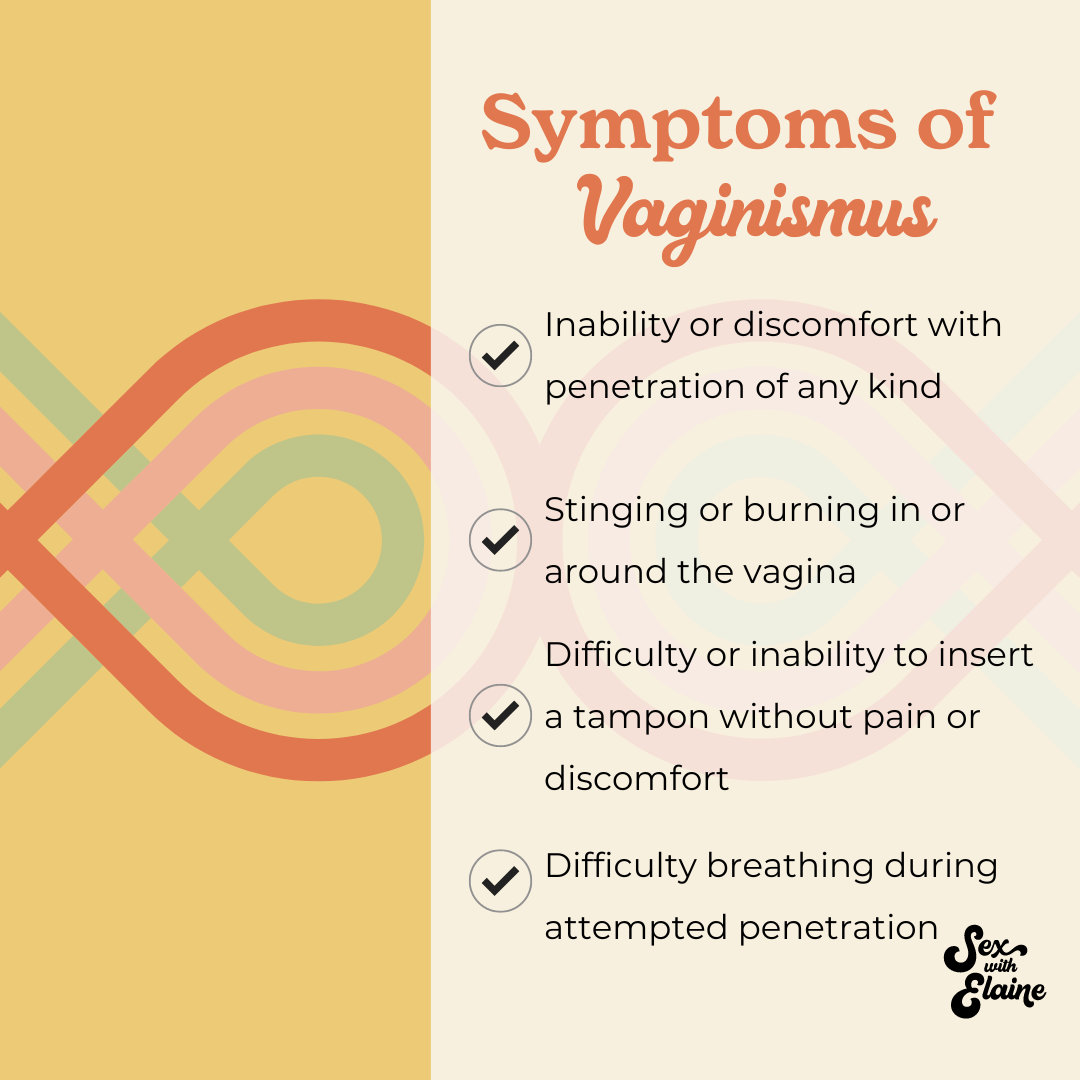What Does Vaginismus Mean? Definition, causes, and how it can impact your life
Everyone thinks sex should happen naturally and easily. Unfortunately, that isn't the case for many people out there. Vaginismus is one of the most common causes of painful intercourse among vulva owners. But what does vaginismus mean? What causes vaginismus? If vaginal penetration by a partner or even a tampon causes you pain, keep reading.
Vaginismus is one of the most common causes of painful intercourse. It is when a vulva owner has involuntary spasms/contractions of the pelvic floor. It can cause penetration to be painful, if not impossible.
Experiencing pain during intercourse isn't spoken about often enough. Yet, it impacts a surprising amount of the vulva-owning population. Many people choose not to seek treatment. Or they aren't correctly assessed by a medical professional. Therefore, the prevalence of vaginismus isn't known.
It is estimated that 2 in every 1000 women have vaginismus.
All products recommended are personally selected by me, Elaine S. Turner. I choose them and genuinely believe in them. However, this article may contain affiliate links. That means if you use that link to buy a product, I may earn a small affiliate commission, or tip, as I like to see it. You can learn more here if you have any questions about my affiliate policy.
What does vaginismus mean?
Vaginismus can be described as involuntary and persistent contractions of the pelvic floor.
These contractions lead to vaginal tightness and pain during penetration.
This tightness and pain can manifest from inserting a tampon or touching yourself.
The term vaginismus is used when there is no apparent organic cause.
That means it isn't caused by anything happening in your body that the doctors can test for.
A doctor may look for organic causes such as cysts or extreme vaginal dryness.
While you may feel sexually aroused, your pelvic floor contractions interfere with penetration.
You may have seen a specialist who attempts to diagnose you with a sexually transmitted infection or thrush.
While it is a prevalent "dysfunction," not all medical experts are equipped to diagnose or treat it.
But once all organic causes have been eliminated, you'll be told you have vaginismus. The title really describes that you experience pain from penetration.
Types of vaginismus
Like many sexual challenges, one name doesn't fit all. For example, many vulva owners may develop symptoms of vaginismus after menopause.
There are a few types of vaginismus:
Primary Vaginismus: You have never been able to experience vaginal penetration. You have suffered from the symptoms for your entire life.
Secondary Vaginismus: When previous vaginal penetration (by person or object) has occurred. However, you develop symptoms of vaginismus later and can't experience vaginal penetration.
Situational Vaginismus: When only some instances of penetration cause pain and discomfort. For example, you may use a tampon without pain, but using a finger or penis causes pain.
Complete/Global Vaginismus: You experience a complete inability to be penetrated by fingers, tampons, or anything similar.
The severity of vaginismus can vary throughout your life and during your cycle. The presence or absence of specific hormones alone can trigger the symptoms of vaginismus. Or it can be triggered by emotional trauma or other psychological factors.
What are the symptoms of vaginismus?
Symptoms of vaginismus will vary depending on which type you have. However, you should speak with a specialist if you've experienced the following symptoms.
Stinging or burning pain in or around the vagina before, during, or after penetration of any kind
Complete inability to be penetrated due to pain
Extreme difficulty and pain during attempts at penetration by a person or object
Difficulty or inability to insert a tampon without pain or discomfort
Long-term sexual pain with no known origin
Difficulty breathing during attempted penetration
Overall, the involuntary tightening of the vaginal muscles is the primary symptom.
The severity of your condition is unique. For some, penetration is possible with time. Others may not be so lucky.
Having vaginismus does not mean you cannot experience sexual pleasure. There are plenty of ways to have sexual fun that does not involve penetration.
Getting diagnosed with vaginismus
Since medical knowledge is limited on vaginismus, it may be challenging to get a diagnosis.
At Sex With Elaine, I strongly suggest seeing a gynecologist or pelvic floor specialist.
It may be worth doing additional research to find doctors with vaginismus experience in your area.
Suppose you cannot be penetrated by a speculum (used during pelvic floor and gynecological examinations).
In that case, your specialist may ask you questions like:
Where do you experience pain during attempted penetration?
Have you ever been able to experience vaginal penetration by a person or object?
How long have you been experiencing pain?
What is the severity of pain you experience during penetration?
Have you tried vaginal dilators?
How often does the pain occur?
Are there any factors that could be triggering it?
Do you have difficulty with vaginal dryness?
During a meeting with your doctor, you'll likely have to be given a pelvic floor exam and an STI screening.
These exams are to eliminate any potential causes of your vaginismus.
You shouldn't be surprised if the medical professional wants or needs to use a speculum. Try to relax, and ask them to be patient.
You may want to try a few different positions to see what is the most comfortable for you.
Many people prefer not to use stirrups.
***Pro-Tip*** If your medical doctor tells you to "relax and use more lubricant," you'll want to find a better-educated specialist.
What causes vaginismus?
The research is not complete in this area. However, there are some generally accepted causes.
Emotional & mental causes
Your mental and emotional well-being are crucial for your overall health. While it may be challenging to hear and accept, it does mean that you have treatment options.
Some mental and emotional causes of vaginismus are:
Fear about pain, pregnancy, sexually transmitted disease or infection, or other consequences of sex
Anxiety about sexual performance or being penetrated
Guilt about the difficulty or inability to have penetrative sex
Troubles with your partner, such as fear of vulnerability or unresolved conflicts
A history of trauma, including life events or a history of rape or other sexual abuse
Adverse childhood experiences, such as being exposed to sexually explicit imagery
The worst part is that your body will start to clamp down when you anticipate pain during penetration. Which will make things worse.
Some breathing techniques and meditation can help you breathe through the experience and take things slowly.
Physical causes
Suppose there is an organic cause for your sexual pain, such as the ones listed below. In that case, you may be suffering from Dyspareunia rather than vaginismus. However, since research is lacking on these disorders, they are often used interchangeably.
Some common physical causes of vaginismus and dyspareunia are:
Vaginal or vulva infections such as a yeast infection or UTI that has gone untreated or uncured
Childbirth or trauma during childbirth
Menopause
Surgery on the pelvic region
Side effects of medication
Health conditions such as cervical cancer or cysts
Inadequate foreplay
Insufficient lubrication
Insufficient knowledge of sexual arousal and health
Often, it is a combination of emotional, mental, and physical triggers that cause vaginismus. It's not your fault, and you're not broken.
It's just an obstacle to overcome. It will take time, patience, and effort to overcome, like all things.
Treatment for vaginismus
Usually, a combination of talk therapy and physical exercises is ideal. Physical activities may include:
Kegel exercises
Use of vaginal dilators
Masturbation practices
Sexual anatomy education
If you have suffered from vaginismus for many years, it can take a long time to recover. Over time, vaginismus can become a self-fulfilling prophecy of sorts.
Many doctors suggest you use vaginal dilators to help get used to the feeling of penetration. However, just pushing one inside you is not enough.
You have to train your brain to anticipate pleasure rather than pain. But how is this done? Through coaching, of course.
Living with vaginismus
Unfortunately, there isn't a simple "cure" for vaginismus.
It can take weeks or months to try different therapy techniques to find the right fit for you.
While it may seem like a long journey, it will be worth the trip if penetration is vital to you.
There is no shame in having vaginismus.
It may feel shameful for you.
It is something outside your control.
There are plenty of sexual activities you can enjoy without penetration.
Oral sex
Stimulation of the clitoris with fingers or a vibrator
Anal sex
Vulva massage
You can feel free to get creative! Just because one thing isn't on the menu doesn't mean you get up and leave the restaurant.
Can sex coaching help with vaginismus?
What does vaginismus mean? It means that you deserve support on this journey.
You don’t deserve to be told to “get over it” or “it’s all in your head.”
Sex shouldn’t be painful or uncomfortable.
You deserve better than that.
After receiving a diagnosis of vaginismus, you may feel lost and hopeless.
Through a combination of discussions and home assignments, you can learn to enjoy penetration.
It may take time and effort.
But imagine living a life free from sexual anxiety and even using a tampon!
Are you willing to invest in yourself and a future free from painful sex?
It'll be worth it.
Contact me today to learn more about how sex coaching can help you overcome vaginismus.
“Focus on where you want to go, not on what you fear.”
Want to learn more about sex, dating, and relationships?
Keep reading!
Do you want to contribute to the Sex With Elaine blog?
SEND ME AN EMAIL!
Enjoy this article?
THEN FOLLOW ME ON INSTAGRAM!
Never miss another helpful tip.



















